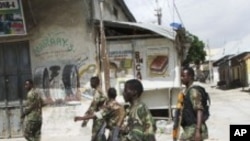Somalia's Transitional Federal Government (TFG) is offering amnesty to remaining insurgents in Mogadishu following the withdrawal of the Islamist group al-Shabab. But it is vowing to continue fighting until Somalia is free of all rebel forces.
The group's departure from Mogadishu has provided a boost of confidence for Somalia's Transitional Federal Government and the African Union peacekeeping forces, AMISOM, both of which have been fighting the insurgent group for a long time. .
"We are prepared to continue fighting until we get al-Shabab completely out of Somalia," said Abdullah Alia Nod, a commander with the TFG forces
A statement that David Shinn, former ambassador to Ethiopia, now professor at the Elliott School of International Affairs in Washington, says might be overly optimistic.
“Taking and holding Mogadishu is one thing but taking and holding south-central Somalia is quite another thing. So I don’t see that as a real possibility,” he said.
Shinn says the Somali government needs to do more.
“The TFG has to show that it has a vision and it has something it can offer to the Somali people; and that’s where it’s failed so far on the political front//Because of internal division within the TFG, constant turnover of government; they change ministers just about every six months. They have a parliament of 550 members, which frankly is totally unnecessary for a country the size of Somalia,” Shinn said.
Shinn says al-Shabab also has its own weaknesses and divisions that could be exploited.
“There are those who have global jihadi agenda. There are those who somewhat have some nationalistic agenda. There are differences between indigenous Somalis and foreign Jihadis who have infiltrated al-Shabab. So they have their own internal problems,” Shinn said.
More importantly, he says, there are divisions within al-Shabab when it comes to food aid.
“There are those who think more latitude ought to be given to Western aid agencies, there are those who don’t want Western aid in but they do allow the Islamic aid agencies. If I had to look at any mistake that al-Shabab has made in the last couple of years, this is by far the biggest: they’ve absolutely botched the relief effort and the Somali people don’t like it,” Shinn said.
Experts say the pullout will allow aid agencies to better address the famine affecting millions in the East African nation. In the meantime, al-Shabab says the pullout was just a change of tactics and has vowed to return to Mogadishu.
Withdrawal of al-Shabab Offers Hope to Somalia's Transitional Government




